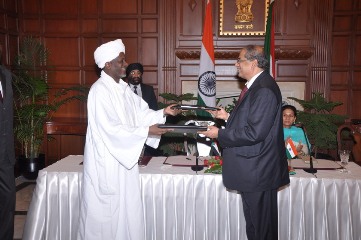India agrees to reschedule Sudan’s lines of credit over ‘difficult economic situation’
July 25, 2013, (KHARTOUM) – The Indian government announced today that it has approved a request by Sudan to revise the repayment terms on lines of credit previously extended by New Delhi.

Sudan state media made no mention of the visit or the agreement and requests by Sudan Tribune to the finance ministry for comment went unanswered.
India’s foreign ministry noted in a press statement that there are six existing lines of credit to Sudan totalling $566.9 million that is managed by the Export Import Bank (EXIM).
“The mutually agreed terms for the lines of credit were arrived at by taking into account the sensitivities of both the countries. The rescheduling has been made by way of relaxation of the interest rate, repayment period and moratorium of the lines of credit”, the statement read in part.
“This is a first request for rescheduling the lines of credit of such magnitude being considered by [the] Government of India and it was favourably considered given the difficult economic situation of Sudan post the secession of South Sudan”, it added.
India’s external affairs ministry also disclosed that the two sides discussed the issue of payment dues owed by the Sudanese government to ONGC Videsh Limited (OVL) and other commercial interests.
“[The] Sudanese delegation assured that this issue will be resolved at the earliest [date]. [The] Sudanese side agreed to make every effort to ensure that Indian commercial interests are not adversely affected”, the ministry said.
According to Ind-Asian news service (IANS), Indian companies currently doing business in Sudan include the state-run BHEL in the power sector, oil and gas explorer ONGC, and Bajaj, Tata and Mahindra from the private sector. Various Indian pharmaceutical companies also operate in Sudan.
Sudan has seen its economy take a nosedive after the South became independent in July 2011, taking with it three-quarters of the once united country’s oil output. According to figures from the International Monetary Fund (IMF), the country’s GDP contracted by 4.4% in 2012.
Oil was the main driver of the Sudanese economy, fuelling an economic boom particularly after the signing of the 2005 Comprehensive Peace Agreement (CPA).
After the country’s partition, the Sudanese government was forced to introduce an austerity budget that saw the partial lifting of fuel and food subsidies which triggered rare but small demonstrations across the country.
Sudan also imposed restrictions on the sale of foreign currency and imports to preserve the already low levels of Forex held by the central bank.
Later, the government also moved to effectively devalue the currency which came under enormous pressures as a result of significant shortages in foreign currencies.
This week’s pact with India is expected to offer some reprieve to a country already labouring under a burden of external debt estimated to have reached $42 billion this year.
A similar agreement was reached in 2012 when China – a major investor in oil, construction and other sectors of the Sudanese economy – agreed to extend Sudan’s debt maturity by an extra five years in light of the loss of oil revenues.
Last year, the Sudanese finance minister complained that the country pays $600 million in debt repayments annually to Arab sovereign funds which he said is a tiny fraction of outstanding foreign debts with interest.
Khartoum has frequently expressed frustration with the international community for not responding to its plea for debt relief which most analysts believe is tied to political conditions, as well as economic ones.
(ST)

